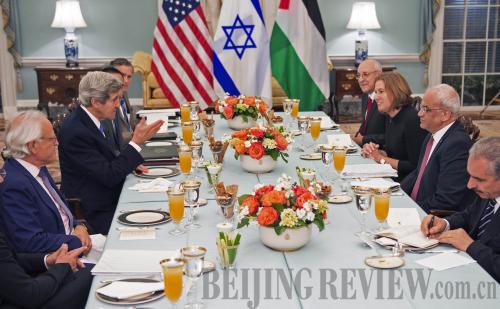|
 |
|
SIT DOWN: U.S. Secretary of State John Kerry (second left) hosts a dinner for Palestinian and Israeli negotiators on July 29 in Washington, D.C. (XINHUA/AFP) |
The efforts of U.S. Secretary of State John Kerry to facilitate peace between Palestine and Israel have paid off—somewhat, at least. After the top U.S. diplomat's six mediation trips to the Middle East within half a year, peace talks were finally resumed on July 29 in Washington D.C., after being suspended in October 2010 due to Israel's expansion of settlement activities on occupied Palestinian lands.
During their meetings, which Kerry described as "constructive" and "positive," Palestinian and Israeli negotiators agreed that substantial talks would be held in the next two weeks, either in Israel or the Palestinian territories. They also pledged to reach a "final-status" agreement over the next nine months.
The political structure and geostrategic map of the Middle East have changed dramatically in recent years. Observers said it is the right time to promote Palestinian-Israeli dialogue as it meets the needs of all parties. However, as leaders from both sides refused concessions on thorny issues including boundary determination and the construction of Jewish settlements, prospects for this new round of talks are not too optimistic.
The moment
Nearly three years have passed since Palestinians and Israelis held their last peace negotiations. The renewal of the talks can be credited first to the new U.S. secretary of state. Unlike his predecessor Hillary Clinton, Kerry shifted U.S. diplomatic attention back to the Middle East from the Asia-Pacific region. In the meantime, observers claimed the changing political situation in the Middle East is a more important factor in restarting the talks.
The turmoil in neighboring Arab countries further worsened the security conditions of Israel, while its tough stance on the Palestinian issue in recent years has isolated Israel in the international community, said Liu Baolai, former Chinese Ambassador to Jordan.
The so-called "Arab Spring" did not improve Israel's geopolitical standing. Anti-Israeli sentiment continued to flare in Arab countries along with the regional turmoil.
The EU on July 19 proposed new guidelines for how it would do business with Israel. The guidelines require the EU and its members to cease any joint activity or funding with Israeli entities in the West Bank, in East Jerusalem, or in the Golan Heights from 2014. The EU holds that those territories are not part of Israel.
Palestine's upgrade to a UN observer state last November put additional pressure on Israel at the international level.
He Wenping, a researcher with the Chinese Academy of Social Sciences (CASS), said with the annual UN General Assembly in September drawing near, both the United States and Israel worry that Palestine might take more steps in the UN to appeal for the international community to press Israel if it doesn't restart peace talks.
For Israel, returning to the table on one hand can enhance its natural alliance with the United States; on the other hand, it can ease pressure from the international community. In addition, resuming talks shows a gesture of goodwill to help stabilize relations with Palestine and improve its security situation.
For Palestine, Liu said, incumbent Palestinian President Mahmoud Abbas has been dedicated to peace talks and the founding of an independent Palestine with territorial integrity all along.
With regional turmoil raging, the Palestinian issue was nearly marginalized. Abbas hopes to make substantial progress in the Middle East peace process through the resumption of talks by the end of his term, Liu added.
| 